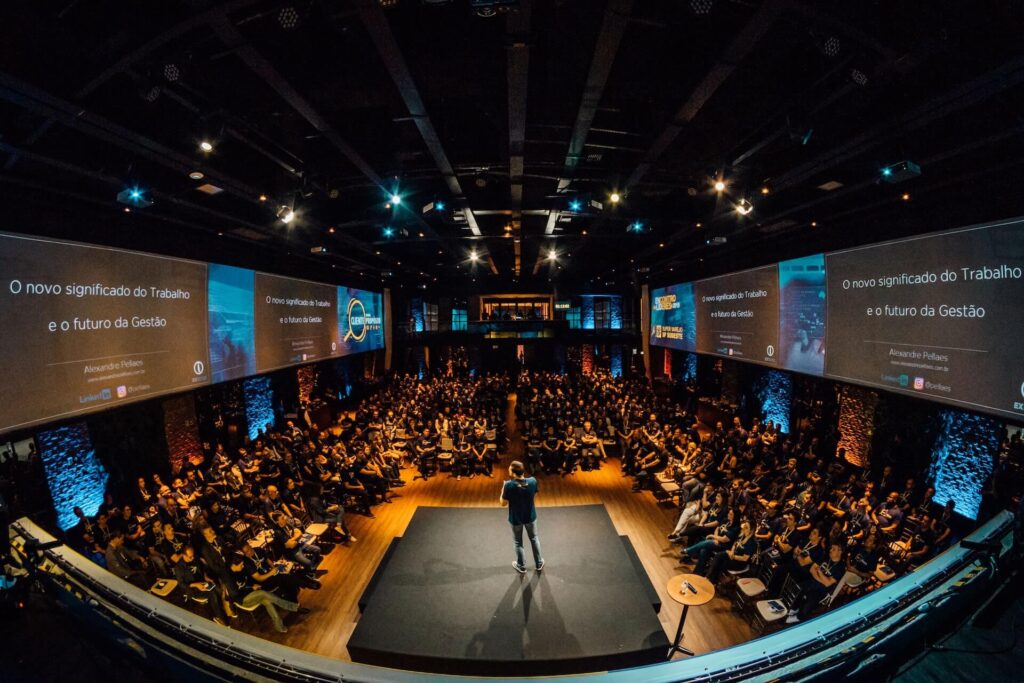Table of Contents
A vast array of instruments and systems are employed in event technology in order to organize, carry out, and evaluate events. From virtual event platforms and mobile apps to live streaming solutions and audience engagement tools, event technology has revolutionized the way events are organized and experienced. It enables seamless communication, data-driven decision-making, and personalized attendee experiences, ultimately enhancing the overall impact
Some Event Technology Trends

Invigorate Your Event Using Augmented and Virtual Reality
Augmented and Virtual Reality (AR/VR) are revolutionizing event technology by creating immersive and interactive experiences. AR overlays digital elements onto the real world, while VR immerses users in a completely simulated environment. This technology enhances attendee engagement, provides unique networking opportunities, and delivers memorable brand experiences. By incorporating AR/VR into events, organizers can create interactive exhibits, gamified experiences, and virtual tours, making their events more engaging and impactful.
AI Chatbots: Your Individualized Event Helper
Artificial intelligence (AI) chatbots have become essential tools in the field of event technology, greatly improving attendee experiences and optimizing event administration. With the ability to automate chores, respond to inquiries, and offer individualized support, these intelligent virtual assistants can improve the effectiveness and enjoyment of events for all parties involved. The way events are planned and attended has been completely transformed by AI chatbots, which give everything from real-time information and event recommendations to round-the-clock support.
Facial Recognition: Streamlining Event Security
Event security is being revolutionized by facial recognition technology, which offers a quick and precise way to identify participants. This system ensures that only authorized individuals obtain access by instantaneously verifying identities by scanning faces against a pre-loaded database. This increases security and expedites the check-in procedure, cutting down on wait times and enhancing the entire experience for attendees. Additionally, event planners can employ facial recognition to track attendance trends, which might yield important data for bettering future events.
Use Event Diagramming Tools to Create Your Ideal Event
For organizing and visualizing perfect events in event technology, event diagramming programs like Lucidchart, Miro, and Coggle are important. Event planners can anticipate possible bottlenecks, manage resource allocation, and guarantee a flawless experience for all participants by using these tools, which create visual representations of event timelines, workflows, and attendee paths. Using tools for event diagramming, planners may work with teams, present their vision to stakeholders, and create extraordinary events that both meet and surpass expectations.
The Potential of Hybrid and Virtual Event Technologies
The potential of hybrid and virtual event technologies in event technology is immense. These event technologies offer a more flexible, accessible, and sustainable approach to event planning. Hybrid events, which combine in-person and virtual elements, allow for wider audience reach and increased engagement. Virtual events, held entirely online, offer cost-effectiveness and global accessibility. Both hybrid and virtual events can incorporate interactive features, such as live streaming, Q&A sessions, and networking opportunities, to enhance attendee experience. As technology continues to advance, the possibilities for hybrid and virtual events will only grow, making them a valuable tool for event planners seeking to reach diverse audiences and maximize impact.
Mobile Event Apps
Attendees can access real-time schedules, speaker biographies, maps, and event information using mobile event apps. They also provide a mechanism for you to interact with guests via push notifications with up-to-date event information, surveys, and live polling.
Some of the emerging technologies

Digital tools
Digital tools have revolutionized the way we work, learn, and communicate. From productivity apps and communication platforms to design software and data analysis tools, digital tools offer a wide range of capabilities to enhance efficiency, creativity, and collaboration. They have become an essential part of our daily lives, enabling us to connect with people around the world, access information instantly, and automate tasks that were once time-consuming or manual.
Virtual reality
A technology known as virtual reality (VR) immerses users in a computer-generated environment, fostering engagement and a sensation of presence. Users can explore virtual worlds, interact with digital items, and experience events as if they were real by donning headsets that have screens and motion sensors built in. Virtual reality (VR) has many uses, such as gaming, entertainment, training, education, and even therapy.
Event gamification
Event gamification is a strategy that incorporates game-like elements into events to increase engagement, participation, and overall enjoyment. By adding elements such as points, badges, leaderboards, and challenges, events can become more interactive and motivating for attendees. Gamification can be used to encourage networking, knowledge acquisition, and participation in activities, making events more memorable and effective.
Wearable technology
It is used to describe electronic gadgets worn on the body. These devices often include sensors that collect data about the wearer’s health, fitness, or environment. Common examples of wearable technology include smartwatches, fitness trackers, and heartrate monitors. These devices are becoming increasingly popular as they offer convenience and personalized insights into various aspects of our lives.
RFID
RFID (Radio Frequency Identification) is a technology that tracks and identifies objects using radio waves. It consists of two main components: a tag (or RFID chip) and a reader. The tag contains a unique identifier, while the reader emits radio waves to interrogate the tag and receive its data. RFID is widely used in various industries, including retail, logistics, healthcare, and access control, due to its ability to automate processes, improve efficiency, and enhance security.
Livestreaming
An important Event technology that allows users to broadcast real-time video and audio content over the internet. It has become increasingly popular in recent years, with applications ranging from live concerts and sporting events to online classes and virtual conferences. Livestreaming platforms offer a variety of features, such as chat rooms, interactive elements, and the ability to save and share recordings. This technology has revolutionized the way we consume and interact with content, making it possible to connect with people and experiences from all over the world in real time.
Broadcasting tools
These are essential for delivering content to a large audience in real-time. They encompass a wide range of technologies, from traditional radio and television broadcasting to modern digital platforms. These tools allow for the dissemination of news, entertainment, education, and other content to a global audience.
Common enquires
Why does event technology matter?
Modern events are not successful without the use of event technology. It raises attendance, boosts the effectiveness of event management, and offers useful information for gauging the impact of the event. Event planners may give guests more immersive, engaging, and unforgettable experiences by utilizing technology in their events.
How is technology changing the event industry?
The event industry is undergoing a technological revolution. Event technology is changing how events are organized, carried out, and experienced—from virtual and hybrid events to AI-powered customization. Tasks related to event management are becoming more efficient with the use of digital solutions, which also improve attendance and offer insightful data. This change in technology is not only changing the event industry, but it is also opening up new possibilities for creative event experiences.
How to Choose the Right Event Tech?
With so many alternatives available, selecting the appropriate event technology may be a challenging undertaking. When picking a choice, it’s critical to take your target audience, budget, and specific event goals into account. By carefully evaluating factors such as scalability, integration capabilities, and user-friendliness, you can select the event tech that will help you create a successful and memorable experience for your attendees.
Future of technology in modern event planning

Technology in contemporary event planning is expected to have even more revolutionary effects in the future. With the rate at which technology is developing, we should anticipate a rise in innovation in the event sector.
Important patterns to keep an eye on are:
Improved Virtual and Hybrid Events:
Following their rise to popularity during the epidemic, virtual and hybrid events are probably going to becoming even more complex. Anticipate developments in AI-driven interaction tools, AR/VR technologies, and more smooth transitions between digital and physical components.
AI-Driven Personalization:
Thanks to artificial intelligence, event coordinators will be able to provide incredibly customized experiences. AI is capable of analyzing attendee data to provide networking opportunities, information, and suggestions.
IoT-Enabled Experiences:
Creating immersive event settings will be made possible in large part by the Internet of Things.
Final words
By embracing trending innovations, event planners can create more immersive, personalized, and sustainable experiences for their attendees. It’s essential to stay informed about emerging technologies and adapt strategies accordingly to remain competitive in the dynamic event industry.